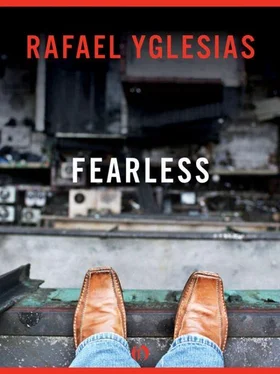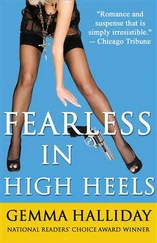Manny’s hand landed on her shoulder, weighing her down. “I’m sorry,” he whispered.
“No you’re not,” she answered fast and that propelled her the rest of the way out of the car. The world seemed to rock under her feet. The black pavement, the one-story hotel, the metal awning that covered the other survivors who had come, was flying, spinning under her high heels.
Manny’s voice sounded behind her. He had gotten out of the car and come around to her side. “I’ll take you in, babe,” he said gently.
She ran toward the awning. Not to escape her husband’s escort. She had to get off the orbiting surface; find walls that would keep her in, safe from nothingness.
She ran past a woman holding a clipboard and brushed against a young black man dressed in a suit and wearing sunglasses.
“Excuse me,” the young black man said in a loud voice.
“Excuse me,” the woman with the checklist also said, leaning toward Carla. “Are you in Dr. Perlman’s group?”
Carla stumbled on a step as she tried to answer and stop and turn all at once. The young black man steadied her and answered: “Yes she is.”
Carla looked at him. His face was a mask, the coffee-colored skin, like his dark sunglasses, an impenetrable opaque surface, giving no hint of whether he was nervously pale or blushing from agitation or haggard from lack of sleep. His hair was a thin helmet. In his elegant charcoal suit he looked as tall and sheer as a skyscraper. He kept Carla balanced with only a light grasp of her elbow. “I remember you from the hangar,” he explained. “I think about you a lot. Did they find your baby?”
“Honey!” a light-skinned black woman appeared from behind him. She pulled at his sleeve, “Don’t blurt it out.” She added to Carla, “He’s sorry. He has nightmares about you — not about you — but about whether your child is safe.”
She had no idea who they were or how they knew about her. What had they seen? Did they know she couldn’t get the seat belt to work? Did they see her run away from the smoke?
The black man bent his tall stiff body toward her. His voice was soft, but deep. It vibrated in her chest. “It was your baby that didn’t make it?” he asked Carla.
“Honey,” his wife said and pulled at his arm. “He’s having trouble…you know, sleeping and such. Making the trip was hard. Very hard,” she mumbled.
The black man stiffened. “We didn’t bring our baby girl this time,” he said, loud, announcing the fact over the heads of the gathering.
Manny scurried in between Carla and the black couple. He looked short and nervous beside the taller, still man. “Here you are,” he said and took her hand possessively, the way a parent takes a child’s to keep it from getting lost.
“Hello, everybody,” a voice said from behind Carla. The crowd turned to look at its source. A broad-shouldered redheaded man was on the top step, holding open one of the glass doors. “I’m Bill Perlman. I’m glad you all came, but standing right here we’re blocking things. So let’s proceed to the conference room. Just go through the lobby to the back. There’s a sign showing the way.”
“Do I check them off here?” the woman with the clipboard asked.
“Wait until later,” Perlman said.
Carla wanted to leave. She was at the head of the crowd and couldn’t retreat, but she didn’t want to walk forward into the lobby either. She had been upset by just one encounter with another survivor. What did the black man mean they didn’t bring their baby girl this time? Was she killed on the plane? No — no babies died. Bubble was the youngest victim. Was he joking? Or angry? Or crazy? Maybe the only survivors who had come were the crazy ones, the ones who couldn’t get over it, like her. She couldn’t stand a roomful of herself.
“Come on, babe, let’s go in,” Manny urged, pulling her.
Even if she kept her mouth shut — and she sure planned on keeping her mouth shut — others might say things about her, the way the black couple had. They might ask her questions or tell stories about her. “I’ll go in,” she said to Manny. The crowd pushed at her back. “But alone,” she added.
“Hi,” Bill Perlman leaned down to her. “You’re Carla?”
“Hello, Doctor,” Manny said. They knew each other?
Although Perlman smiled at Manny, he addressed the whole group. “I’d prefer it if only survivors came in today. Your spouse is welcome if you feel you need them, but if you can come in alone, that’s even better.” He lowered his voice to say to Carla, “So why don’t you come in with me?” Perlman offered his hand.
“I’ll wait out here,” Manny said.
She took Perlman’s hand. His fair skin was covered with freckles: light brown spots on a pink background. She thought him ugly. In an oversized, clownish friendly way — but he was still ugly. Perlman kept hold of her hand as they walked into the lobby and down the hallway to the conference room. He swung it back and forth gently, as if they were skipping into a playground. “Come by car?” was his only question. He nodded at her answer.
The room wasn’t as big as she expected and it appeared unfurnished despite the presence of more than fifty folding chairs, the majority still unopened and propped against the rear wall. There were no tables, no lamps, only the chairs, arranged not in neat rows facing in one direction, but haphazardly, at odd angles, sometimes in opposition, sometimes side by side. Apparently thoughtless hotel employees had simply set up a few chairs without rhyme or reason and dumped the rest. Other than the same blue carpet that was in the lobby there was nothing to distinguish it from a storeroom. Carla looked at Perlman, expecting him to be angry.
“Let’s arrange these in a circle if we can,” Perlman said mildly to the woman with the clipboard. “If you want you can sit next to me,” he said to Carla. He tapped the black man who had spoken to Carla on the shoulder. “Can I deputize you to help me with the chairs?” He gestured at two more men. “And you gentlemen? Let’s get them in a circle, even if we have to make them two rows deep.”
Soon almost everybody was busy clanking the chairs as they tried to manage the unfolding and placement. Someone had the idea to space them so that the second row was centered on the gaps of the first, allowing better sight lines. While people moved about there were hellos and hugs of recognition. Many of them seemed to know each other. Carla didn’t. She was disturbed by this until she remembered that the others had been together in the hospital, treated in the emergency rooms and released to be housed in motels, or kept in semiprivate rooms, wandering in and out, talking in the hall, smoking cigarettes in the lounge, sipping coffee in the cafeteria. She was the only one who had been given a private room; she couldn’t have walked out even if she had felt like seeing anyone, and no survivors visited her. Why should they? They had all become friends that first horrible night while she was drugged and alone.
She didn’t accept Perlman’s offer to sit beside him. She took a chair in the second row at the back toward the corner and watched the friendly survivors. To her they were happy. Not hurt by the accident; they had been softened. On the plane they had moved with the stiff protected motions of strangers; in this room they brushed shoulders easily and smiled at each other with their eyes, like tipsy cousins at a wedding. For what seemed to be a long time the room buzzed from dozens of conflicting conversations. Carla stayed silent and looked through the turned heads at Perlman. After delegating the work of setting up, he had taken a seat, folded his hands in his lap and watched. He noticed that Carla had her eyes on him and gestured for her to come beside him. Carla shook her head. She tensed up, ready to run for the door if he came her way. Instead he smiled. He didn’t interrupt all the conversations. He waited. Gradually people fell silent, suppressing others, until Anally only one person was still talking.
Читать дальше












